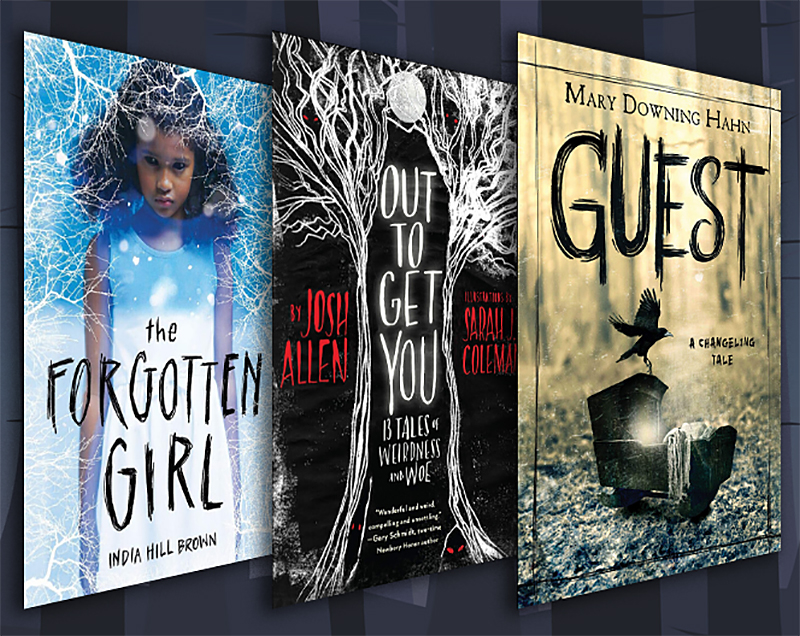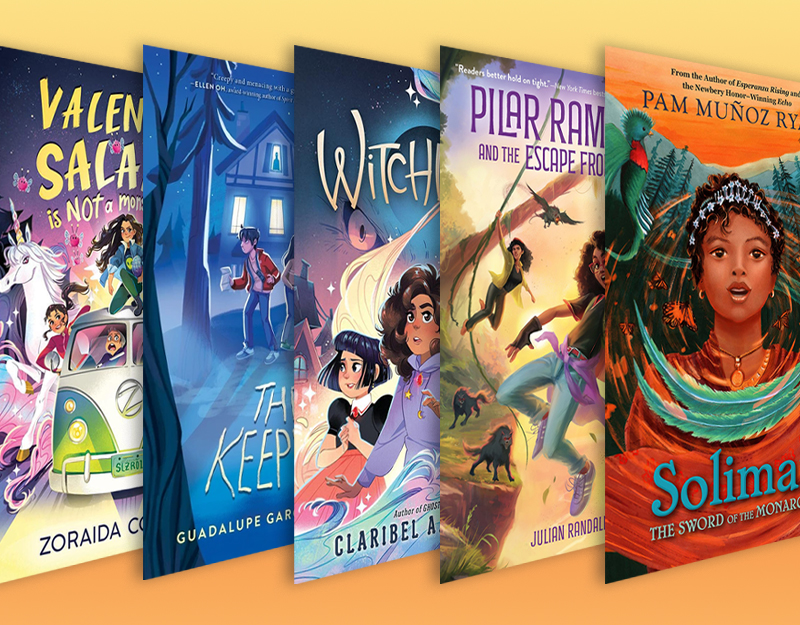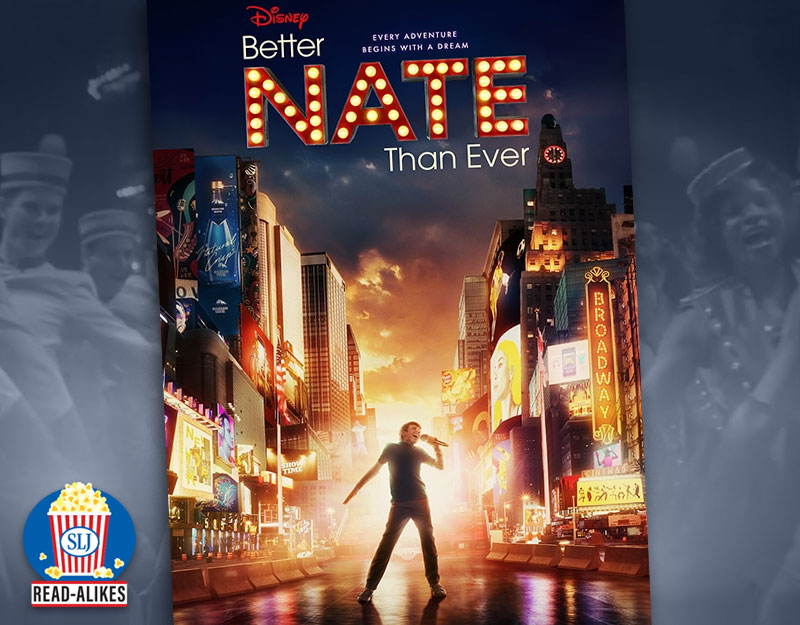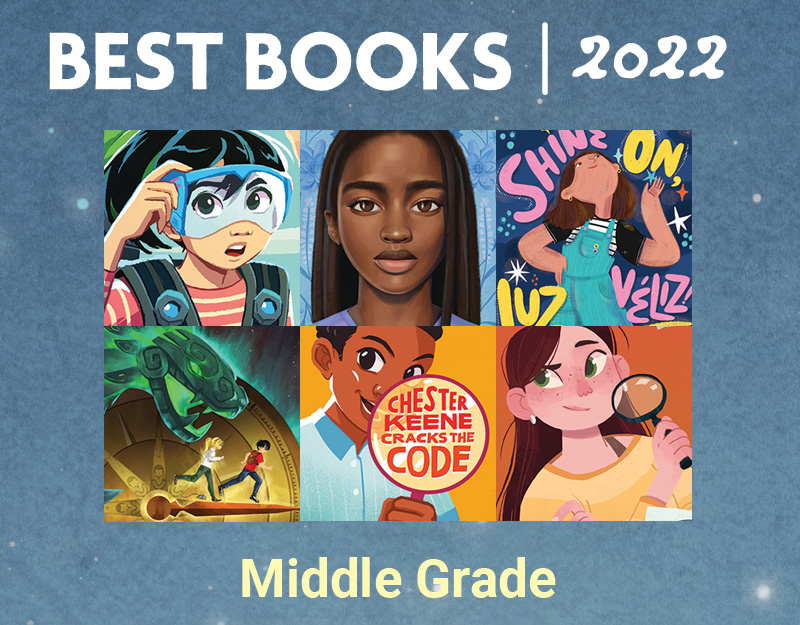Facilitating Racial Healing Circles, a recap of recent ALA training by Lisa Krok
Recently, I had the opportunity to learn about facilitating racial healing circles. This was a part of the training provided by ALA’s Great Stories Club program on Growing Up Brave in the Margins. The series is a part of the W.K. Kellogg Foundation’s Truth, Racial Healing & Transformation (TRHT) efforts to bring about sustainable, transformational change, and address both contemporary and historic effects of racism in the nation and in communities. The books selected for the Great Stories Club (GSC) feature characters and plots that explore questions of identity, race, equity, history, social justice, and institutional change.
In order to qualify to be a part of the program, librarians/teachers/community partners need to complete a comprehensive grant application, detailing their proposal of how GSC will be used with their teens to tackle the goals stated above. Those who are awarded these grants (about 35 nationwide this session) are awarded four sets of eleven books each. For this session, the books are pictured below:
ADVERTISEMENT
ADVERTISEMENT
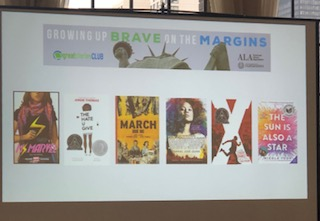
There are six choices to choose from, so participants select four out of the six, to best meet the needs of their teens. One copy goes to the leader of the book club, and the remaining ten copies are given to the teen participants. Additionally, the grant provides $1200 for extra copies of books and programming to accompany the selected texts. Grant applicants are encouraged to use the programming funds for racial healing practitioners. Grantees are provided with travel and lodging expenses to attend the multi-day training in Chicago.
Before we even went to Chicago for the training, each of us was asked to complete the supplied webinars on microaggressions and racial healing circle methodologies. We also engaged in online quizzes to assess implicit bias. These are free sets of tests provided by Harvard University. It was fascinating to see how our ideas about our own implicit biases were confirmed or not by these quizzes.
Implicit Bias: Take a Test https://implicit.harvard.edu/implicit/takeatest.html
Before beginning any type of talking circles, group agreements must be made. All participants are empowered to contribute to the creation of this agreement. Some common agreements are things like:
- Approach people with an open mind
- Demonstrate active listening
- Be comfortable with brief silence
- Lean into discomfort
- Speak your truth
- Sharing is by volunteers only, no forced sharing
- Maintain confidentiality
The agreement can then be posted for group reference.
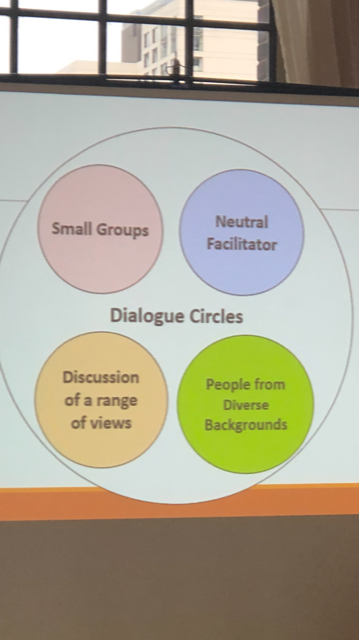
The Latin root of “facilitator” is facilis, which means easy.. The facilitator’s job is to make things easier for the rest of the group. Some ways they manage the discussions are:
- Help the group create ground rules
- Not representing self as an expert on the issue
- Create opportunities for everyone to participate
- Does not offer their own opinion
- Bring in points of view that haven’t been talked about
- Value group processes and the ways they work together
- Support democratic process
ADVERTISEMENT
ADVERTISEMENT
Key facilitator skills are reflecting, clarifying, and summarizing during the discussion. Also be aware of non-verbal signs, which may vary amongst cultures. Neutrality is aspirational, but no one is 100% neutral. Challenges during the discussion may require redirecting or referring to the group agreement. If misinformation is presented, ask follow-up questions and find sources for information. In the event of tension or conflict, try the following:
- “I” statements
- Take a break
- Address the tension in the room (keeping ground rules in mind)
Another tool that I shared with the group is the pocket guide from Teaching Tolerance.org. These foldable pocket-sized guides provide ways to speak up when witnessing racism or other offensive words and/or actions. They focus on the strategies of interrupting, questioning, educating, and echoing. They focus on addressing specific words and actions, not the person. These free pocket guides can be downloaded from:
Tolerance Speak Up Pocket Card https://www.tolerance.org/sites/default/files/general/speak_up_pocket_card_2up.pdf
I was impressed with the training overall, which included facilitators from ALA, the W.K. Kellogg Foundation, and -Everyday Democracy. We were provided with book specific discussion questions for driving narrative change, and activities and tools to use for racial healing circles. We participated in the circles several times throughout the course of the training, taking on the roles of both the participants and the facilitators.
More to come as this project unfolds throughout the next six months…stay tuned!
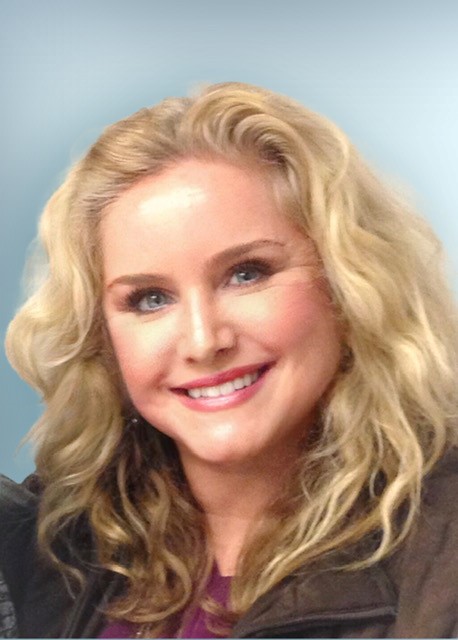
Lisa Krok, MLIS, MEd, is the adult and teen services manager at Morley Library and a former teacher in the Cleveland, Ohio, area. She is the author of Novels in Verse for Teens: A Guidebook with Activities for Teachers and Librarians, forthcoming from ABC-CLIO in February 2020. Lisa’s passion is reaching marginalized teens and reluctant readers through young adult literature. She was appointed to the 2019-2020 YALSA Presidential Advisory Task Force, served two years on the Quick Picks for Reluctant Reader’s team, and is on the BFYA committee . Lisa can be found being bookish and political on Twitter @readonthebeach.
Filed under: Professional Development
About Karen Jensen, MLS
Karen Jensen has been a Teen Services Librarian for almost 30 years. She created TLT in 2011 and is the co-editor of The Whole Library Handbook: Teen Services with Heather Booth (ALA Editions, 2014).
ADVERTISEMENT
ADVERTISEMENT
SLJ Blog Network
2024 Books from Pura Belpré Winners
In Memorium: The Great Étienne Delessert Passes Away
Winnie-The-Pooh | Review
Parsing Religion in Public Schools
ADVERTISEMENT



